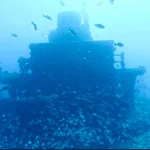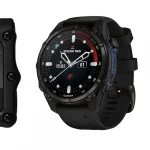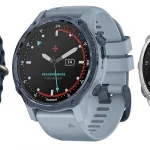Table of Contents
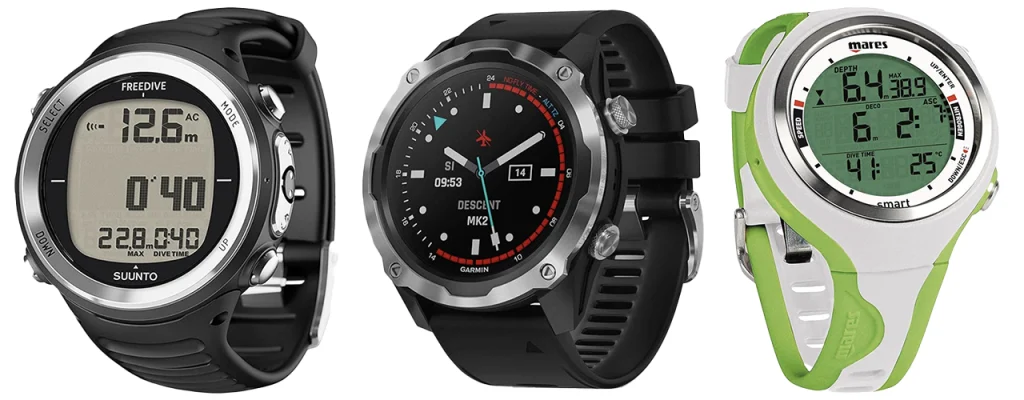
This article reviews top freediving computers, including the Suunto D4F, Garmin Descent Mk2, and Mares Smart Apnea, highlighting their features and suitability for divers.
| Category | Weight | Suunto D4F | Garmin Descent Mk2 | Mares Smart Apnea |
|---|---|---|---|---|
| Design and Build | 0.15 | 4.5/5 | 5.0/5 | 4.5/5 |
| Display and Readability | 0.20 | 4.0/5 | 5.0/5 | 4.5/5 |
| Features and Functionality | 0.25 | 4.0/5 | 5.0/5 | 4.5/5 |
| Ease of Use | 0.15 | 4.5/5 | 4.5/5 | 4.5/5 |
| Battery Performance | 0.10 | 4.5/5 | 4.5/5 | 4.0/5 |
| Value for Money | 0.15 | 4.5/5 | 4.0/5 | 4.5/5 |
| Overall Score | 1.00 | 4.35/5 | 4.71/5 | 4.45/5 |
Editor’s Choice
For freediving, the Garmin Descent Mk2 is our Editor’s Choice. Its advanced metrics, vibrant AMOLED display, and multi-sport functionality set it apart as a versatile and high-performing dive computer. Whether you’re tracking surface intervals, ascent rates, or exploring other sports like scuba diving or running, the Descent Mk2 delivers unmatched precision and flexibility.
Final Verdict: ★★★★★ (4.71/5)
| Image | Product | Detail | Price |
|---|---|---|---|
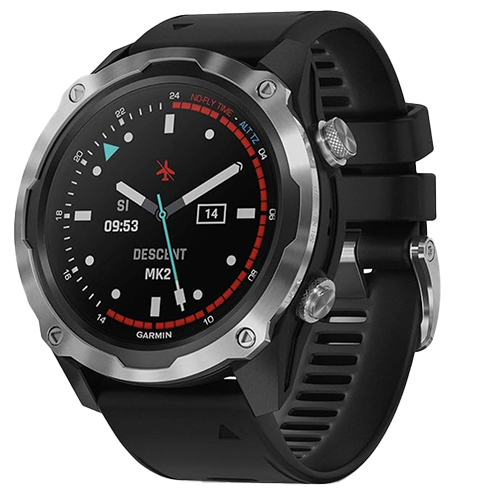 | Garmin Descent Mk2 |
| Click for Best Price |
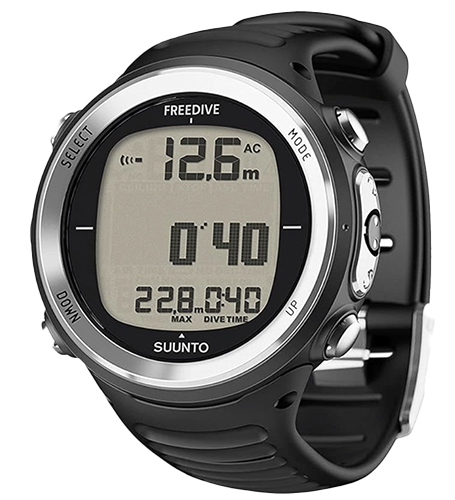 | Suunto D4F |
| Click for Best Price |
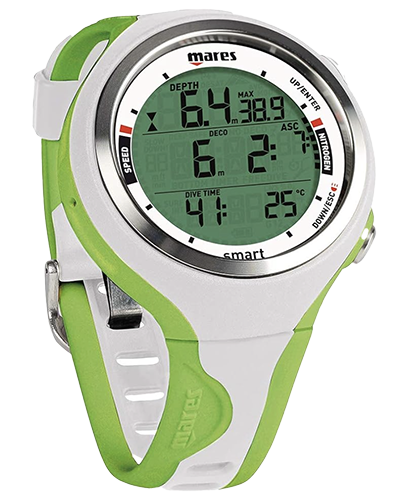 | Mares Smart Apnea |
| Click for Best Price |
Introduction
Freediving demands precision, control, and a deep connection with your body and the underwater environment. Whether you’re a beginner or an advanced freediver, having a reliable freediving computer can significantly enhance safety and performance. The ideal freediving computer tracks vital metrics like dive time, depth, surface intervals, and ascent rates, ensuring you stay within safe limits while optimizing your experience underwater.
In this guide, we compare three of the best freediving computers: the Suunto D4F, Garmin Descent Mk2, and Mares Smart Apnea. Each model is designed with features tailored for freedivers, offering a blend of functionality, durability, and user-friendliness. From the straightforward and budget-friendly design of the Suunto D4F to the advanced multi-sport capabilities of the Garmin Descent Mk2, and the apnea-focused features of the Mares Smart Apnea, these dive computers cater to a range of freediving styles and preferences.
Best For: Freedivers seeking accurate metrics, reliable performance, and features tailored to their skill levels and diving goals.
What Divers Should Look for in a Freediving Computer
A reliable freediving computer is a critical tool for monitoring your performance and ensuring safety during dives. Here are the key factors to consider when choosing the best freediving computer:
Accurate Depth and Time Tracking
- Depth Measurement: Look for a computer with precise depth sensors capable of handling the ranges you intend to dive.
- Dive Time Monitoring: Accurate tracking of dive durations helps you manage oxygen use effectively.
Surface Interval Tracking
- Recovery Times: Proper surface interval tracking ensures adequate recovery between dives, reducing the risk of shallow water blackout or other safety issues.
Apnea-Specific Features
- Ascent/Descent Rate Monitoring: Tracks how quickly you ascend or descend, helping to avoid injury or inefficiency.
- Custom Alarms: Visual or audible alarms for depth, dive time, or surface interval reminders ensure you stay within safe limits.
Battery Life
- Extended Usage: Freediving computers should have long-lasting batteries to accommodate multiple sessions without frequent recharging.
- Replaceable or Rechargeable Options: Choose a model based on your preference for travel convenience or eco-friendliness.
Display Readability
- High Contrast Screens: Bright and clear displays are essential for visibility underwater, especially in low-light conditions.
- Simple Layouts: Focused data presentation minimizes distractions during dives.
Build Quality and Comfort
- Compact Design: A lightweight and streamlined design reduces drag and ensures comfort on the wrist.
- Durability: Resistance to scratches, impacts, and saltwater corrosion ensures longevity.
Ease of Use
- Intuitive Interface: A simple and user-friendly design is essential for quick adjustments, especially underwater.
Multi-Sport Functionality (Optional)
- Versatility: Advanced models like the Garmin Descent Mk2 offer features for other activities such as scuba diving, hiking, and fitness tracking, making them ideal for multi-sport enthusiasts.
Why It Matters
Choosing the right freediving computer enhances safety, improves performance, and provides invaluable insights into your dives. By focusing on these factors, you can find a model that aligns with your diving style and goals.
Why These Three Dive Computers Are Ideal for Freediving
The Suunto D4F, Garmin Descent Mk2, and Mares Smart Apnea are three exceptional dive computers that cater specifically to the needs of freedivers. Each model offers unique features and benefits, ensuring accurate monitoring, safety, and enhanced performance underwater.
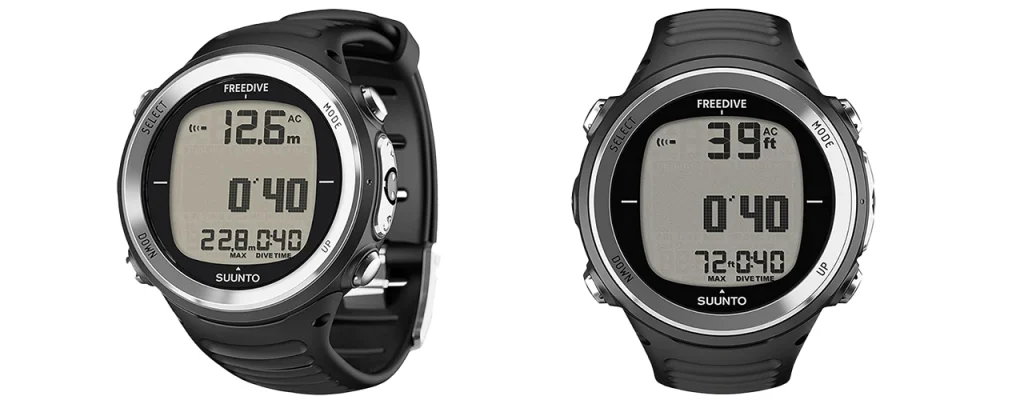
Suunto D4F
- Why It’s Great for Freediving:
- Designed exclusively for freediving, the Suunto D4F is a lightweight and straightforward computer that tracks depth, dive time, and surface intervals with precision.
- Custom Depth Alarms: Set depth and time alarms to enhance safety and focus during dives.
- Compact and Durable: Its minimalist design and durable construction make it comfortable and reliable for frequent use.
Best For: Beginner to intermediate freedivers seeking simplicity and reliability without unnecessary features.
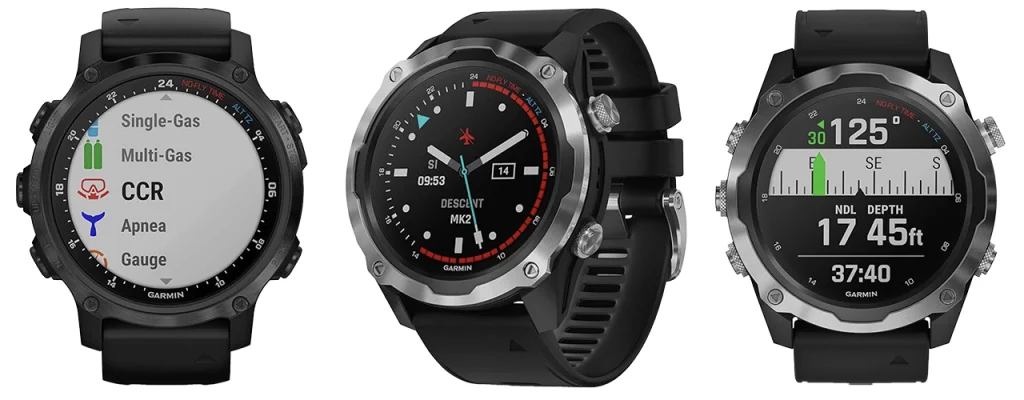
Garmin Descent Mk2
- Why It’s Great for Freediving:
- Offers advanced freediving metrics alongside multi-sport functionality, including fitness tracking and navigation tools.
- Apnea Mode: Tracks depth, dive time, and recovery intervals, while also monitoring ascent and descent rates.
- High-Resolution AMOLED Display: Provides vibrant, easy-to-read visuals for critical dive data.
- Multi-Sport Versatility: Ideal for freedivers who also engage in scuba diving, hiking, or fitness activities.
Best For: Advanced freedivers and multi-sport enthusiasts who want a feature-rich, all-in-one device.
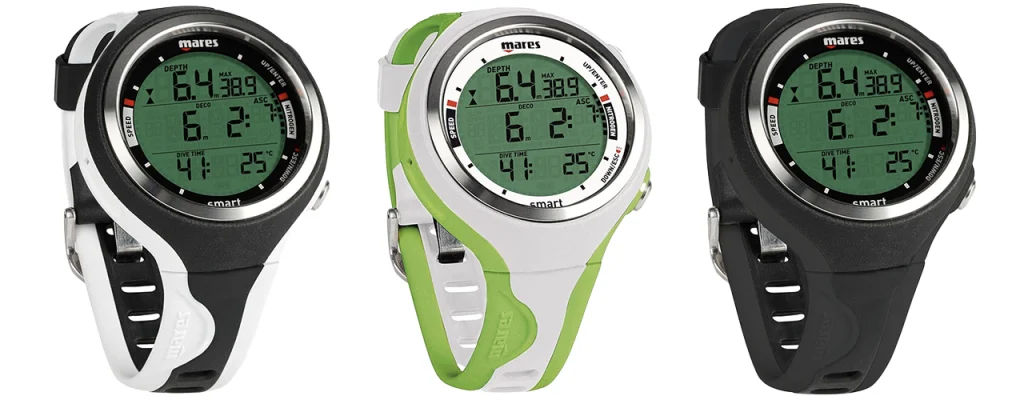
Mares Smart Apnea
- Why It’s Great for Freediving:
- Specifically designed for apnea diving, the Mares Smart Apnea delivers accurate depth and time tracking with customizable alarms.
- Apnea-Specific Features: Includes detailed surface interval tracking and visual/audible alarms for dive safety.
- Streamlined Design: Lightweight and compact, ensuring comfort and minimal drag underwater.
Best For: Freedivers who prioritize apnea-focused features and a compact, cost-effective design.
Key Takeaways
- Suunto D4F: Ideal for simplicity and precision in freediving, offering essential features in a sleek design.
- Garmin Descent Mk2: A premium option for advanced freedivers and those who want multi-sport functionality.
- Mares Smart Apnea: Perfect for apnea-focused divers seeking a streamlined and feature-rich device at a reasonable price.
These three dive computers deliver safety, reliability, and performance, making them ideal choices for freedivers of all skill levels.
Comparison at a Glance
| Category | Weight | Suunto D4F | Garmin Descent Mk2 | Mares Smart Apnea |
|---|---|---|---|---|
| Design and Build | 0.15 | 4.5/5 | 5.0/5 | 4.5/5 |
| Display and Readability | 0.20 | 4.0/5 | 5.0/5 | 4.5/5 |
| Features and Functionality | 0.25 | 4.0/5 | 5.0/5 | 4.5/5 |
| Ease of Use | 0.15 | 4.5/5 | 4.5/5 | 4.5/5 |
| Battery Performance | 0.10 | 4.5/5 | 4.5/5 | 4.0/5 |
| Value for Money | 0.15 | 4.5/5 | 4.0/5 | 4.5/5 |
| Overall Score | 1.00 | 4.35/5 | 4.71/5 | 4.45/5 |
Summary
- Suunto D4F: ★★★★☆ (4.35/5) – A lightweight and reliable choice for beginner and intermediate freedivers who value simplicity and affordability.
- Garmin Descent Mk2: ★★★★★ (4.71/5) – A feature-rich and versatile option for advanced freedivers and multi-sport enthusiasts seeking top-tier functionality.
- Mares Smart Apnea: ★★★★☆ (4.45/5) – A compact and apnea-focused device perfect for freedivers who prioritize specialized features and ease of use.
Detailed Dive Computer Highlights
Suunto D4F

The Suunto D4F is a straightforward, no-frills dive computer tailored specifically for freediving.
- Depth and Time Tracking: Provides accurate monitoring of dive depth and duration, essential for freediving performance and safety.
- Custom Alarms: Set depth and dive time alarms to help maintain safe dive parameters.
- Durable and Lightweight: The slim, comfortable design minimizes drag and ensures easy wearability.
- Surface Interval Tracking: Tracks recovery times to enhance safety and optimize dive performance.
Best For: Beginner and intermediate freedivers who want a reliable, easy-to-use device without unnecessary extras.

Garmin Descent Mk2
The Garmin Descent Mk2 is a premium multi-sport device that excels in freediving and beyond.
- Advanced Freediving Metrics: Tracks depth, dive time, ascent/descent rates, and surface intervals with precision.
- Multi-Sport Functionality: Includes modes for scuba diving, hiking, running, and fitness tracking, making it ideal for versatile users.
- AMOLED Display: Offers sharp, vivid visuals that make underwater data easy to read.
- Connectivity and Apps: Features GPS, Bluetooth, and compatibility with Garmin Connect for logging and analyzing dives.
- Durable and Stylish: Combines a rugged design with a modern, smartwatch-like appearance.
Best For: Advanced freedivers and multi-sport enthusiasts seeking a feature-packed and versatile dive computer.

Mares Smart Apnea
The Mares Smart Apnea is designed with apnea-specific features, making it a standout for freedivers.
- Apnea-Specific Features: Tracks detailed dive metrics, including depth, dive time, and surface intervals, with audible and visual alarms for safety.
- Customizable Alarms: Tailor depth and time alerts to suit your specific diving style.
- Compact and Comfortable: Lightweight and streamlined, it offers minimal drag and maximum comfort underwater.
- Intuitive Interface: User-friendly design ensures quick adjustments and easy navigation of settings.
Best For: Freedivers who prioritize apnea-specific functionality in a lightweight, affordable package.
Key Takeaways
- Suunto D4F: A simple and reliable option for freedivers who prefer essential features in a compact design.
- Garmin Descent Mk2: A high-end choice for advanced freedivers and multi-sport users looking for a versatile and connected device.
- Mares Smart Apnea: An apnea-focused computer that balances specialized features with affordability and comfort.
Pros and Cons
Suunto D4F
Pros
- Lightweight and compact design minimizes drag and ensures comfort.
- Simple interface tailored specifically for freediving.
- Custom depth and time alarms enhance safety and focus during dives.
- Durable construction for frequent use in various conditions.
- Affordable price point, making it accessible for beginner and intermediate freedivers.
Cons
- Limited features compared to more advanced models; lacks multi-sport functionality.
- No air integration or compatibility with other diving modes (e.g., scuba).
- The monochrome display is less vibrant than competitors’ color screens.
Garmin Descent Mk2
Pros
- Advanced metrics for freediving, including ascent/descent rates and surface intervals.
- Multi-sport functionality includes scuba diving, hiking, running, and fitness tracking.
- AMOLED display provides sharp, vibrant visuals for easy readability underwater.
- Connectivity options like GPS, Bluetooth, and Garmin Connect enhance logging and analysis.
- Durable yet stylish design doubles as an everyday smartwatch.
Cons
- Premium price may not appeal to budget-conscious freedivers.
- Complex interface and abundance of features may overwhelm beginners.
- Shorter battery life compared to simpler freediving computers due to its multi-sport capabilities.
Mares Smart Apnea
Pros
- Apnea-specific features, including detailed surface interval tracking and customizable alarms.
- Lightweight and streamlined design for comfort and minimal drag.
- Affordable price makes it accessible for most freedivers.
- Intuitive interface allows for easy setup and navigation.
Cons
- Lacks multi-sport functionality, limiting use beyond freediving.
- The display, while clear, is less advanced compared to high-end models like the Garmin Descent Mk2.
- No connectivity options for syncing or analyzing dive logs.
Summary
- Suunto D4F: A budget-friendly, no-frills option for beginner freedivers, though it lacks advanced features.
- Garmin Descent Mk2: A premium device for advanced freedivers and multi-sport enthusiasts, though its price and complexity may deter beginners.
- Mares Smart Apnea: A cost-effective, apnea-focused device with excellent safety features, ideal for freedivers who don’t need additional functionalities.
How to Choose the Right Dive Computer for You
Selecting the perfect dive computer for freediving depends on your skill level, diving goals, and feature preferences. Here are the key considerations to guide your decision:
Assess Your Freediving Experience
- Beginners: Look for a simple and affordable model like the Suunto D4F, which offers essential depth and time tracking with intuitive functionality.
- Advanced Freedivers: Opt for a computer like the Garmin Descent Mk2 with advanced metrics and additional features for performance optimization.
Determine Your Feature Needs
- Apnea-Specific Features:
- If apnea-focused metrics such as surface interval tracking and ascent/descent rates are your priority, consider the Mares Smart Apnea or Suunto D4F.
- Multi-Sport Functionality:
- Divers who participate in other activities like scuba diving, hiking, or running should consider the Garmin Descent Mk2 for its versatility.
Evaluate Display and Readability
- High Contrast Displays: For vibrant, easy-to-read visuals, the Garmin Descent Mk2 with its AMOLED screen is the top choice.
- Simple and Functional: If you prefer straightforward data without clutter, the Suunto D4F or Mares Smart Apnea are excellent options.
Consider Battery Life and Charging
- Extended Battery Life: For multiple dive sessions, the Mares Smart Apnea and Suunto D4F offer long-lasting batteries with fewer charging needs.
- Rechargeable Options: If you prefer eco-friendly and modern charging solutions, the Garmin Descent Mk2 is ideal.
Balance Budget and Features
- Budget-Friendly: If affordability is key, the Suunto D4F or Mares Smart Apnea provide apnea-specific features at a lower price.
- Feature-Rich Investment: The Garmin Descent Mk2 is worth the premium price for those who want a multi-functional, high-tech device.
Who Should Choose What?
- Suunto D4F: Ideal for beginners and intermediate freedivers seeking simplicity and affordability.
- Garmin Descent Mk2: Best for advanced freedivers and multi-sport enthusiasts who value versatility and cutting-edge features.
- Mares Smart Apnea: Perfect for apnea-focused divers who prioritize safety and compact design at a reasonable cost.
Why It Matters
Selecting the right freediving computer ensures that you stay safe, optimize your performance, and enjoy a seamless diving experience tailored to your specific needs and goals.
Conclusion and Recommendation
Choosing the right freediving computer is essential for monitoring your performance and ensuring safety underwater. Each of the models reviewed—the Suunto D4F, Garmin Descent Mk2, and Mares Smart Apnea—offers unique strengths tailored to different freediving needs.
- Suunto D4F: A straightforward, budget-friendly option ideal for beginner and intermediate freedivers. Its lightweight design, simple functionality, and essential safety features make it a reliable choice for those starting their freediving journey.
- Garmin Descent Mk2: A premium, feature-rich device designed for advanced freedivers and multi-sport enthusiasts. With its AMOLED display, advanced metrics, and multi-function capabilities, it’s the top choice for those seeking a high-tech, versatile dive computer.
- Mares Smart Apnea: A compact and apnea-focused dive computer that strikes a balance between affordability and functionality. Its apnea-specific features and user-friendly design make it an excellent option for divers focused solely on freediving.
Editor’s Recommendation
- Best for Simplicity and Affordability: Suunto D4F
- Best for Advanced Features and Multi-Sport Use: Garmin Descent Mk2
- Best for Apnea-Specific Diving: Mares Smart Apnea
Whether you’re a beginner looking for simplicity or an advanced diver seeking cutting-edge features, one of these freediving computers will help you dive confidently and safely while enhancing your underwater experience.

